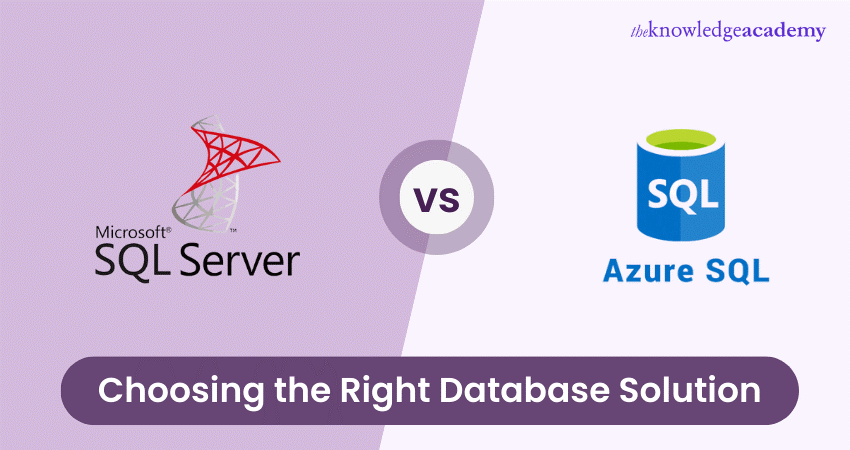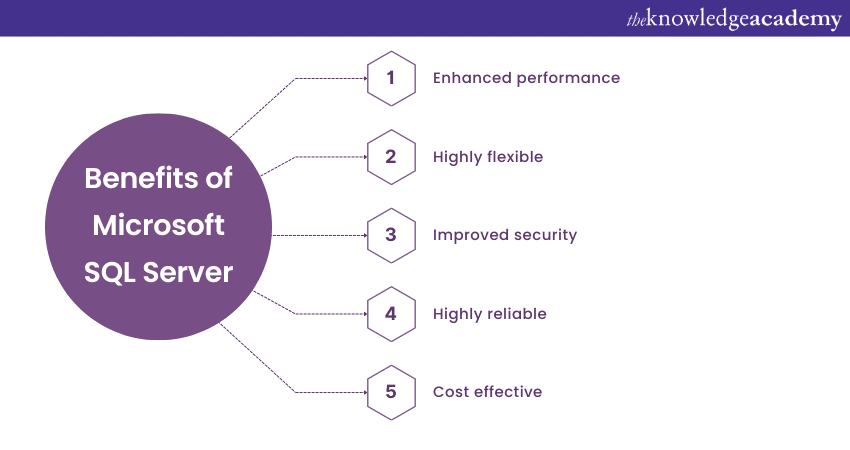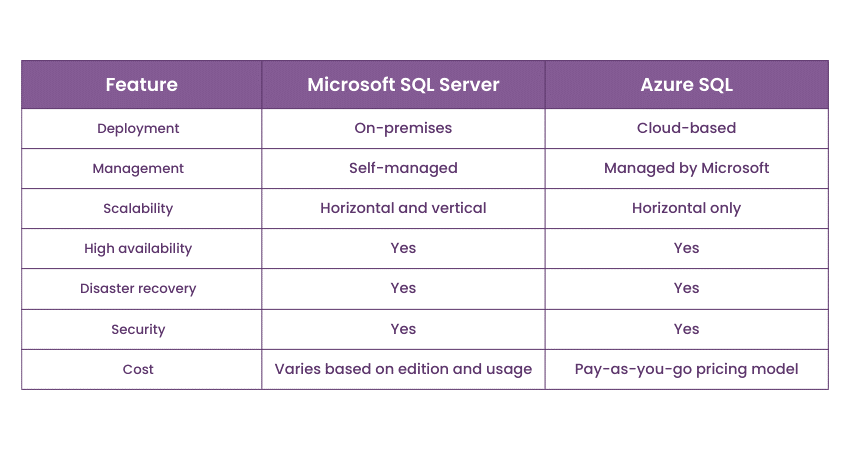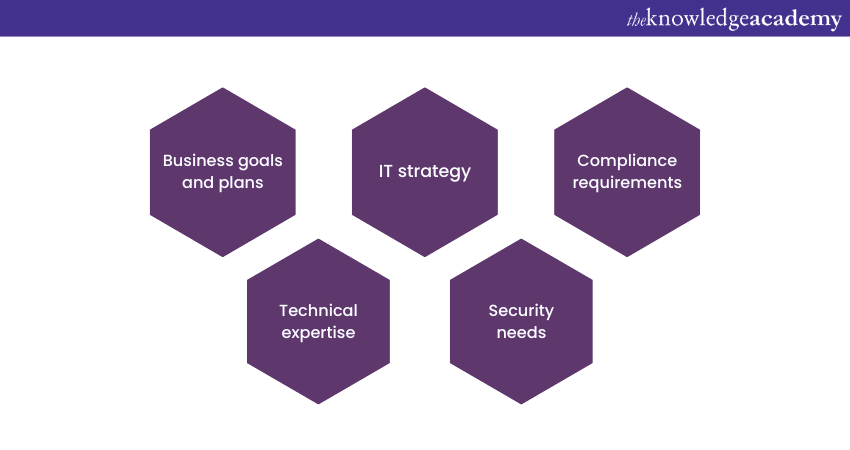We may not have the course you’re looking for. If you enquire or give us a call on 01344203999 and speak to our training experts, we may still be able to help with your training requirements.
Training Outcomes Within Your Budget!
We ensure quality, budget-alignment, and timely delivery by our expert instructors.

Database management is critical for companies, regardless of the industry of their operations. Choosing the right database solution between Microsoft SQL Server vs Azure SQL can be challenging. By learning their differences, you make an informed choice that aligns with your organisation's data management needs.
According to Statista, Microsoft SQL Server is ranked the world's third most popular database management system. Read this blog to learn the differences between Microsoft SQL Server vs Azure SQL and get an insight into which one is better and what to choose.
Table of Contents
1) What is Microsoft SQL Server?
2) What is Azure SQL?
3) Key differences between Microsoft SQL Server vs Azure
4) Choosing between Microsoft SQL Server and Azure SQL
5) Conclusion
What is Microsoft SQL Server?

Microsoft SQL Server is a versatile and scalable Relational Database Management System (RDBMS) used in on-premises environments. It provides several features for efficient data storage, retrieval, and management.
SQL Server supports various data types and enables complex queries and advanced data analysis. It has robust security measures and uses the following features to ensure data protection:
a) Authentication: SQL Server authenticates the identity of the users accessing the database, ensuring secure and authorised access to the data.
b) Authorisation: It implements authorisation controls to determine the access and privileges granted to individual users, safeguarding data integrity and confidentiality.
c) Data encryption: It uses encryption techniques to protect sensitive information, adding an extra layer of security to prevent unauthorised data access and maintain confidentiality.

What is Azure SQL?
Azure SQL is a cloud-based database service offered by Microsoft, delivering scalable and reliable business solutions. It offers companies a secure, cost-effective cloud-based database solution with seamless integration capabilities and simplified management. Some of its key features include:
a) Scalability: Azure SQL allows effortless scaling of databases based on demand, ensuring optimal performance and cost efficiency.
b) High availability: Automated backups, geo-replication, and automatic failover increase availability and data durability.
c) Security: Advanced threat detection, data masking, and built-in security measures protect sensitive information.
d) Integration: Seamless integration with Azure services like Data Factory, Logic Apps, and Analysis Services enables powerful data workflows and advanced analytics.
e) Cost-effective: No upfront hardware investment, flexible pricing options, and pay-as-you-go models make Azure SQL a cost-effective choice.
f) Ease of management: Streamlined development and management through integration with tools like Visual Studio and SQL Server Management Studio.
Learn the Database concepts using MySQL client with our Introduction to MySQL course. Join now!
Key differences between Microsoft SQL Server vs Azure
When choosing the perfect database solution for your organisation, understanding the key differences between Microsoft SQL Server and Azure is crucial. Both options offer powerful capabilities but have distinct features that can influence your decision. Let's dive into the key differences and find the ideal database solution for your needs.

a) Deployment: Microsoft SQL Server is an on-premises database solution, whereas Azure SQL is a cloud-based service provided by Microsoft as part of the Azure platform.
b) Scalability: Azure SQL offers seamless scalability, allowing businesses to scale databases up or down based on demand. Microsoft SQL Server requires manual scaling and hardware upgrades.
c) Management: Azure SQL database provides a fully managed solution, reducing administrative tasks. Microsoft SQL Server requires more hands-on management and maintenance.
d) Availability: Azure SQL offers built-in high availability and automatic backups, ensuring data availability. Microsoft SQL Server requires manual configuration for high availability.
e) Security: Both solutions offer robust security features, including authentication, authorisation, and data encryption. Azure SQL provides additional built-in security measures specific to the Azure platform.
f) Common Language Runtime (CLR): Microsoft SQL Server supports CLR integration, allowing developers to write stored procedures and functions using .NET languages. SQL Server on Azure VM (Virtual Machine) does not support CLR integration.
g) Integration: Azure SQL integrates seamlessly with other Azure services, enabling powerful data workflows and analytics. Microsoft SQL Server integrates well with Microsoft technologies like .NET and Visual Studio.
h) Cost: Azure SQL eliminates upfront hardware costs and offers flexible pricing models. Microsoft SQL Server requires hardware investments and has licensing costs.
i) Data types: Microsoft SQL Server and Azure SQL support many data types, allowing flexibility in storing and manipulating different data types.
j) Backup: Azure SQL provides automated backup functionality, flexible retention policies, and point-in-time restore capabilities. Microsoft SQL Server requires manual backup configuration and maintenance.
k) Size: Azure SQL databases have size limitations based on the selected pricing tier, while Microsoft SQL Server's size depends on hardware limitations and storage capacity.
Supercharge your SQL skills with our industry-leading Introduction To SQL Training - Signup now and level up your database expertise!
Choosing between Microsoft SQL Server and Azure SQL

Several key factors must be considered when selecting a database solution for your organisation. These factors are crucial in finding the right database solution that aligns with your business needs and goals. Consider the following factors for determining which one is better and what to choose:
a) Organisation's requirements and goals: Assess data management needs, such as data volume, complexity, and performance requirements. Determine the goals you aim to achieve with the database solution.
b) Scalability needs: Consider your organisation's growth potential. Also, evaluate if the chosen database solution can scale effectively to accommodate increasing data volumes and user demands.
c) Budget constraints: Evaluate the cost implications associated with the database solution, including licensing, maintenance, and infrastructure requirements. Ensure it fits within your budgetary limitations.
d) IT infrastructure and expertise: Assess your IT team's existing IT infrastructure and expertise. Determine if the chosen database solution aligns with your infrastructure capabilities and if your team has the necessary skills to manage and maintain it.
When it comes to choosing a database solution and making an informed decision requires evaluating the pros and cons of different database solutions. By considering these factors, you can select the right database solution for your organisation's specific needs and long-term success.
Unleash your SQL prowess and master advanced techniques with our Advanced SQL Training - Signup now!
Conclusion
By reading this blog, we hope you understand the differences between Microsoft SQL Server vs Azure SQL. Microsoft offers both, but each has different benefits and aspects that make one more desirable than the other. Selecting the right database management system depends on your budget, your organisation's requirements, and other factors.
Explore the world of databases and gain in-demand expertise with our SQL Training courses - Signup now and enhance your SQL skills!
Frequently Asked Questions
Upcoming Office Applications Resources Batches & Dates
Date
 Microsoft Excel Course
Microsoft Excel Course
Mon 3rd Jun 2024
Mon 17th Jun 2024
Mon 1st Jul 2024
Mon 15th Jul 2024
Mon 5th Aug 2024
Mon 19th Aug 2024
Mon 2nd Sep 2024
Mon 16th Sep 2024
Mon 7th Oct 2024
Mon 21st Oct 2024
Mon 4th Nov 2024
Mon 18th Nov 2024
Mon 2nd Dec 2024
Mon 9th Dec 2024
Mon 16th Dec 2024
Mon 13th Jan 2025
Mon 3rd Feb 2025
Mon 10th Mar 2025
Mon 7th Apr 2025
Mon 19th May 2025
Mon 9th Jun 2025
Mon 14th Jul 2025
Mon 4th Aug 2025
Mon 8th Sep 2025
Mon 6th Oct 2025
Mon 10th Nov 2025
Mon 1st Dec 2025







 Top Rated Course
Top Rated Course


 If you wish to make any changes to your course, please
If you wish to make any changes to your course, please


